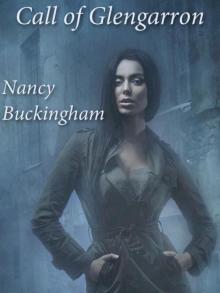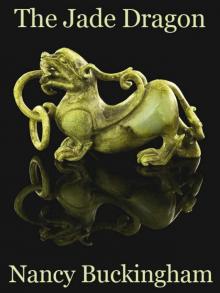- Home
- Nancy Buckingham
The Jade Dragon Page 2
The Jade Dragon Read online
Page 2
I could only fall back upon a reiteration of what I had already said—that I longed to meet my grandmother now that I knew of her existence, that I wanted to try and persuade her to forget the bitterness of the past, that I somehow felt it was vitally important to do this.
Dr. Carlisle sighed deeply. “There is something more I should tell you, my dear—something your father told me in confidence, as between close friends.” He was standing with his back to the fireplace in a characteristic pose, smoothing
his gray sidewhiskers. “It was a great sadness to your mother that she was forced to make a choice between her filial duty and the man she loved, and she always longed for a reconciliation with her parents. When you were born, Elinor, she believed that the moment had come to try and move their
hearts. She wrote to them at some length, certain they would share her happiness at the news that they now had a granddaughter. She pleaded for their understanding and forgiveness, begged for their blessing upon her marriage, and asked that she might take you to see them. However…”
“You mean, her letter was ignored?”
He shook his head. “Worse than that, Elinor. Two weeks passed, and a letter arrived from Portugal. Your mama opened it joyfully, but inside she found only her own letter. It had been read; the envelope was slit open. But there was no other enclosure, no word of love or affection—nothing. It almost broke your dear mother’s heart.”
“Oh, how dreadful!” I exclaimed. “Poor Mama.”
Dr. Carlisle’s pale gray eyes regarded me with compassion. “So you understand, Elinor, why it is impossible for you to think of going to Portugal. It is quite out of the question.”
“No, it is more important than ever now,” I insisted. “Don’t you see, I must try to put things right, to wipe out the bitterness. I must somehow make my grandmother understand that her daughter was not a wicked, unfeeling young woman, that she only disobeyed her parents because of the supreme love she felt for my father—love that could not be denied. My grandmother must accept this for her own sake as much as anything. Before she dies, she must find it in her to forgive her daughter.”
I was speaking with great passion, justifying my decision. Yet even as the words left my lips I wondered to what extent they represented the truth. This old lady who was my grandmother made only a hazy picture in my imagination, whereas before me, as clearly and distinctly as if he were still standing in the room, was the tall, overbearing figure of Stafford Darville. How much of the stubborn determination that filled me now, I asked myself uneasily, was a refusal to heed his unwanted advice—a need to demonstrate that I cared not one jot for his opinion?
Whatever the reason, nothing — no one was going to make me change my mind.
Chapter 2
The persistent thumping of the engines had kept me awake for most of the night. Or perhaps it was my thoughts that held sleep at bay. These past few days, preparing for my journey, I had been swept along on a high tide of excitement. But now that I was actually en route for Portugal, I had time to pause and consider whether I had acted too impetuously. Had I been altogether wise, I wondered now, in insisting on catching the first mailboat sailing to Lisbon from the London docks?
I glanced across to the other berth, where my traveling companion seemed to have slept the night through undisturbed. Mrs. Forrester had been selected by Dr. Carlisle from the steamship company’s passenger list and had readily agreed to be my chaperone during the voyage. She was in her early fifties, I judged—a rather dumpy person with a mass of unruly gray hair that was constantly escaping from its pins. But though her appearance did not flatter her, Beatrice Forrester had a cheerful, friendly disposition. Last evening, while we unpacked and settled into our cabin, she explained to me that she had been visiting England for the birth of her first grandchild. She was now returning to Lisbon to rejoin her husband, who was on the minister’s staff at the British Legation.
Typically, the Carlisles had been kindness itself when they realized that I could not be dissuaded from going to Portugal. All the necessary arrangements had been smoothly made, and Aunt Mildred had taken me on a shopping expedition to Harrods in Knightsbridge to fit me out for the trip.
On the evening before my departure Oliver had come from his hospital to dine at Harley Street. Afterward, none too subtly, he and I were left alone together in the drawing room. Oliver had unfortunately been swayed by his parents’ wishes, and imagined himself to be in love with me. Now, to my dismay, I realized that he was about to make a proposal of marriage—or at least attempt to reach an “understanding” with me. By chattering animatedly about this and that I managed to deflect him and defeat his purpose. I suppose it was cowardly of me, but I felt that it would have been too cruel to quench the Carlisles’ hopes just as I was going away. With any luck, I thought, Oliver’s feelings would change by the time I returned.
My companion roused when the steward knocked with our early-morning tea, and we both got up and started to dress. Half an hour later we were having breakfast in the saloon. While I did my best with the poached finnan haddie Mrs. Forrester insisted on ordering for me, she inquired, “Do I gather, Elinor, that this will be the first time you have met your Portuguese grandmother? I am sure you must be looking forward to it eagerly.”
“Yes indeed. Though I have to admit that I’m a little apprehensive. Do you happen to know the Milaveira family at all, Mrs. Forrester?”
“Only by hearsay. I knew, of course, that the old conde had died rather unexpectedly—that was just before I left Lisbon to visit my daughter. By all accounts, the Milaveiras have had more than their share of trouble recently.”
I looked up at her. “In what way do you mean?”
I sensed her sudden evasiveness and wondered if this could be because she knew the story of my mother. More likely, I thought, she had heard rumors about the heavy burden of debt of which Stafford Darville had told me. Shrugging my question aside, she asked, “Can you speak Portuguese, Elinor?”
“Not really. My mother used to talk to me in Portuguese sometimes when I was a small girl, but it’s years since I heard it spoken. I’ve brought a dictionary and phrase book with me, and I intend to study them during the voyage. Perhaps you will be kind enough to give me some conversational practice, Mrs. Forrester?”
“Of course I will, my dear. But it’s only fair to warn you that my accent is quite atrocious. Many English people find it a difficult language to speak. There are so many subtleties in the vowel sounds, and the rhythm is a little strange to our ears.”
“Oh dear, I hope I shan’t have too much difficulty picking it up.”
“I shouldn’t worry if I were you. Most educated Portuguese are fluent in English or French—often both. I’m sure you’ll get along very well.”
I found myself glancing up instinctively every time anyone entered the saloon, and eventually Mrs. Forrester asked if there was anything wrong. “You seem to be on the lookout for someone, Elinor.”
I felt the color rising to my cheeks. “It’s just that Dr. Carlisle noticed Mr. Stafford Darville’s name on the passenger list, but so far I’ve seen no sign of him aboard.”
“You are acquainted with Mr. Darville, then?” She sounded a little surprised.
I nodded. “It was he who came to tell me of my grandfather’s death. I have only met him on that one occasion.”
Mrs. Forrester broke off a corner of toast and buttered it slowly while choosing her words. “No doubt Mr. Darville will be joining the ship at Dartmouth, to shorten his time at sea. He will have traveled down from London by train and spent the night in a comfortable bed at the King’s Arms Hotel—very nice too, for those who can afford the luxury.” She paused, then added, “Whether or not you see him on board, though, you are sure to see all you want of that gentleman when you reach your grandmother’s home at Cintra.”
It was evident that Mrs. Forrester did not approve of Stafford Darville, but I could not find the courage to inquire the reason directly. Instead, I
said, “I didn’t realize that I should be likely to meet Mr. Darville at the Quinta dos Castanheiros. I suppose he has to go there in connection with his wine business.”
She looked at me strangely. “Surely you know that he is connected with the Milaveira family by marriage?”
“Oh.”
It was odd that I’d not imagined Stafford Darville as a married man. Yet a moment’s reflection told me it was only to be expected—a man of his age and position in the world, whom, undoubtedly, many women would find attractive. He could scarcely have avoided finding a wife.
“To whom is he married, Mrs. Forrester?” I asked.
“He was married, my dear—he is now a widower. Goodness gracious, though, I imagined you would know all about that. His wife, let me see now .... she would have been a cousin of your mother’s, I think. Yes, that’s right. She was the daughter of your grandfather’s younger brother. Luzia Darville died a few months ago in the most tragic circumstances. It was not long after the death of their infant son.”
“Oh, how terrible for him!” I exclaimed. “I had no idea. What happened, Mrs. Forrester?”
She made an elaborate business of pouring another cup of tea. “I think it better that you should hear the details from your own family, Elinor. I wouldn’t want to mislead you.”
“But please—
She shook her head firmly. “One piece of advice I will give you, my dear, is to avoid Stafford Darville until you know more about him. I doubt that you will be hearing much to the credit of the man.”
Mrs. Forrester declined to say another word on the subject. As soon as breakfast was over, she invited two women of her acquaintance to sit with us in the lounge, which gave me no chance to persuade her to change her mind. After a while I excused myself and went up on deck. I was still there, pacing about restlessly, when from out of the misty distance I saw the coastline emerge—the rocky cliffs of Devonshire. Very soon now we would be putting in at Dartmouth before we finally left English shores and headed southward.
I went to the rail and stood watching as we turned into the mouth of the River Dart and edged upstream. Presently, the charming little harbor town came into view, the houses and cottages steeply terraced upon a craggy hill. A small knot of people was gathered on the quayside. Among them I could pick out a tall figure in an Ulster greatcoat that I guessed at once must be Stafford Darville. But I did not linger to make sure. I had no wish for him to catch sight of me standing there, as though I were watching out for him.
* * * *
All that day the weather worsened, and during the evening, when we entered the Bay of Biscay, we met the full violence of a westerly gale. The vessel rolled and pitched, and I quite expected to spend another disturbed night. But a feeling of weariness overtook me, and I found myself drifting off to sleep. By now I was accustomed to the steady pulse of the great engines, and it seemed a safe, reassuring sound.
In the morning, when I rose to get dressed, Mrs. Forrester looked up at me doubtfully from her berth. “You’d be better advised to remain lying down, Elinor. I intend to ask the steward to bring just a little dry toast to eat here in the cabin. Why don’t you do the same?”
“But I want to go on deck and watch the storm. It should be exciting.”
She smiled resignedly. “Oh, very well, if you must. But do take great care, my dear.”
Up on deck it was a new world to me. The wind tore at my skirts angrily, as though trying to break my grip on the brass handrail and fling me bodily into the seething water. Slowly, hand over hand, I struggled my way around to the leeward side of the vessel, where by contrast it seemed suddenly calm. The lone figure of a man stood leaning against the outer rail. He was bareheaded, his dark hair streaming in the wind as he gazed out to sea. Though just a silhouette against the white foam of the tossing waves, I knew at once that it was Stafford Darville.
I hesitated, wondering whether to retreat. Then he seemed to sense my presence and turned to look at me. “We meet again. Miss Rosslyn,” he called against the wind. “But would you not find it more comfortable to stay below in this weather?”
My hackles rose at his implication that poor, weak females made bad sailors, and nothing would have induced me to go back now. Luckily, I seemed to have found my sea-legs. I was confidently able to judge the moment to let go my hold and walk across the deck to join him, achieving the maneuver without a stumble.
“A storm at sea is a new experience for me,” I said. “I find it quite exhilarating.”
‘Then you are unlike most of your sex,” he replied. “But avoiding mal de mer is largely a matter of disciplining oneself. It seems you have the right attitude of mind, Miss Rosslyn.”
It was a change to hear a note of approval in his voice, however slight. After a moment’s hesitation, I ventured to put to him the question that had been in my mind since yesterday.
“Mr. Darville, why did you not tell me that you are related by marriage to the Milaveiras?”
“Perhaps I should apologize for being so remiss,” he remarked with heavy irony.
“I ... I only meant that as I shall probably see you at the Quinta dos Castanheiros, it seems odd that you didn’t mention the fact.”
“I am sure that my omission has been amply rectified by that good lady, Mrs. Forrester. Doubtless she gave you all the details, heavily embroidered.”
“She did not,” I said crisply. “She told me no more than is perfectly natural in the circumstances.”
“Which is?”
‘That you were married to a cousin of my mother’s, and ... and that you lost your wife and child very tragically. That is all she told me.”
“How very commendable of her to resist such a chance to gossip. I suppose, Miss Rosslyn, that you are now consumed with curiosity to know every last tidbit?”
I refused to be riled by his sarcasm and said evenly, “Your wife was a member of the Milaveira family, about which I know almost nothing, so I do not apologize for my curiosity. But naturally, I realize that it must be painful for you to speak of what happened.”
He turned away from me, leaning with his elbows on the rail. His voice was harsh, as though charged with anger. “My son, Edward, was burned to death, Miss Rosslyn. He was eighteen months old—just a baby.”
“Oh, how ... how dreadful!” I gasped in horror.
“But it happened eight months ago,” he went on. “It is time I put it all behind me, do you not agree?”
I shook my head but did not speak. I understood now that his biting sarcasm stemmed from a deep, burning torment. When at last he spoke again, the bitterness was gone, and his voice was flat, almost devoid of expression.
“I was visiting a wine grower I do business with, a big estate over the River Tagus by Palmela, when I received a telegraph message that my house in Lisbon had caught fire. I hastened home to find a blackened ruin. The blaze had started, apparently, in the room below the nursery, where my son slept. The house was an old one, the timbers dry as tinder, and by the time the pumps arrived, it was already an inferno beyond control. Little Eduardo perished, and his nursemaid too, poor woman—in trying to save the boy she lost her own life. None of the other servants were hurt. My wife escaped without an outward mark on her body, but ever afterward the tragedy played on her mind.”
“It is not to be wondered at,” I whispered huskily. “Nothing could be worse for a mother than having to stand by helplessly while her child dies.” I knew with piercing intensity how his poor wife must have felt. Had I not myself suffered a similar agony six years ago, powerless to help while only a few yards off my mother’s lifeblood ebbed away?
Stafford Darville remained silent for a few moments, absently twisting the gold signet ring on his finger. “Luzia was always delicate, and ... and highly strung, and little Edward’s death seemed to unhinge her completely. After the fire we took temporary refuge at the Quinta dos Castanheiros. It was my intention to set about acquiring a new home in Lisbon immediately, but the doctor warned me against tak
ing my wife away from her family circle, where there would always be company to distract her. He was afraid that, left too much alone, she might brood and torment herself with feelings of guilt, and this would endanger any hope of her returning to a state of normality.” He gave a deep sigh. “But it was not to be. Within two months, Luzia, too, was dead.”
“You mean she died from grief?”
“Her death is a complete mystery,” he said quietly, “One day, when I had gone to Lisbon on business, my wife ordered a carriage and left the quinta without telling anyone where she was going. Later, the coachman returned alone. He reported that Luzia had ordered him to drive her to Cascais, a seaside village not far from Cintra, and had there dismissed him. From that moment on I have been unable to trace her movements. At dawn next morning, the crew of a fishing smack returning to harbor came across a woman’s body floating in the Tagus, just off Almada, some fifteen miles away.”
“So she was ... drowned?” I faltered. “But did no one witness the accident?”
“No one. And there is no explanation of why Luzia decided to go to Cascais that day. Clearly, she was in a very agitated state of mind, and we can only presume that she stumbled, or perhaps became dizzy, and fell into the water, and that there was nobody to save her.”
For a brief moment his dark eyes met mine, and I saw the pain in them. I longed to ease his grief, to bring him comfort. But I was afraid that any words I might find to say would seem so unbearably trite, so utterly facile, that I remained silent.
Abruptly, he let go his hold on the ship’s rail and straightened to his full height, towering above me. “Forgive me, Miss Rosslyn, for having burdened you with my private sorrows.” He bowed to me stiffly. “No doubt we shall meet again soon.”
* * * *
Two days later I was startled into wakefulness in the dark hours before dawn by the sound of hoarse shouting, the rattle of chains, and the heavy tramping of feet on the deck above. Through the porthole I could see the lights of a city. We had arrived at Lisbon.

 The Other Cathy
The Other Cathy Design for Murder
Design for Murder Valley of the Ravens
Valley of the Ravens The October Cabaret
The October Cabaret Model Murder
Model Murder Murder in the Cotswolds
Murder in the Cotswolds Deadly Deceit
Deadly Deceit Return to Vienna
Return to Vienna Shroud of Silence
Shroud of Silence The Silver Castle
The Silver Castle A Cotswolds Legacy
A Cotswolds Legacy Marianna
Marianna Cold Coffin
Cold Coffin Kiss of Hot Sun
Kiss of Hot Sun Call of Glengarron
Call of Glengarron Quest for Alexis
Quest for Alexis The Jade Dragon
The Jade Dragon